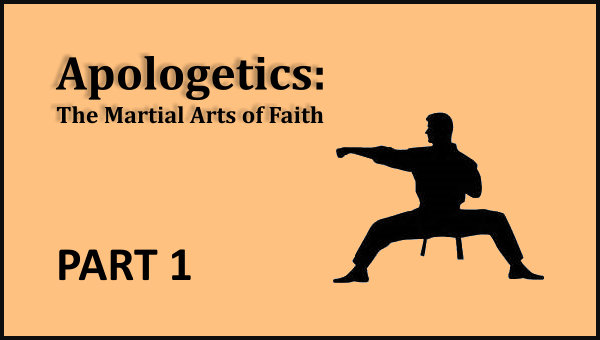By Tyson Thorne

Last week we examined what it means to be spiritually “fit” and learned how to be properly motivated to exercise our faith beyond the basics. We even recommended some ways in which you might act on your faith, growing stronger and deeper in your relationship with God. Today I’ll introduce you to what some might consider the martial arts of faith – apologetics. This involves defending the truths of the Christian faith using a variety of methods including historic truth, revealed truth and even logic. Being an apologist it isn’t for everyone, however, the basics should be practiced by every believer.
The apologists creed is 1 Peter 3.15, “But set Christ apart as Lord in your hearts and always be ready to give an answer to anyone who asks about the hope you possess.” In case you think this involves being argumentative and pushy, Peter goes on to tell us just how to “answer” challengers or seekers, “Yet do it with courtesy and respect, keeping a good conscience, so that those who slander your good conduct in Christ may be put to shame when they accuse you.” While it may appear to some that apologetics is going on the offense, it is really another form of serving God and others.
In the early days of Christianity, the discipline of apologetics was necessary to show Jews that Jesus is their Messiah, and to convince the rest of the world that Jesus is their salvation. In the second century A.D. apologists were largely responsible for writing the creeds and setting down what is considered “orthodox” theology. They defended the faith from being usurped by heretical teachings. During the Age of Enlightenment apologists responded by showing how matters of faith were not at odds with scientific truth, establishing that all truth belongs to God. In modern times they have opposed shoddy science and persuasively challenged false world views. For these reasons many consider apologetics beyond their reach, considering it a discipline of ministers or the Christian “elite”.
While you may never write a creed or expose a heresy, chances are you have performed some form of apologetics. If you have ever answered a question about Jesus or a passage of Scripture, then you have “done apologetics”. That’s right, explaining why you have faith in Jesus, why you believe the Bible is God’s word, or even why you go to church are all examples of defending the faith. In fact, these are the most common, if not the most celebrated, examples of the task. Since you’ve already started your path to becoming an apologist, don’t you think you should continue?
Apologetics is most often thought of in terms of a debate as the goal is to change a person’s view about Biblical truth. This includes (but is not limited to) the truth of Jesus’ nature and their need for a savior. For this reason, apologetics is a part of evangelism, which is something we are all called to (Matthew 28.18-20). Apologetics goes beyond debate, however, and is often simply explaining truth in a way that is relevant to your audience.
When serving as an elder in a church startup the elder team took on the responsibility of writing a doctrinal statement. These are the very basic truths of Christianity that all who wished to become members needed to agree with. Gone were such theological doctrines as Calvinism or Arminianism, or man’s two-part or tri-part nature. These were the truths that, if one wanted to call themselves a Christian, they needed to believe. A form of that work is used on this site here.
Now that you know what apologetics is, and what it is used for, tomorrow we’ll overview the methods of apologetics.
Click the link to go to part two: http://think-biblically.com/8-blog/356-apologetics-2
|
|